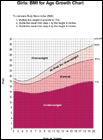
Overweight Children
Why are some children overweight?
There are more overweight children today than ever before. About 15 percent of children and teens in the United States are overweight. Many children eat too many calories from high fat foods, sweets, and large portion sizes. This can cause a child to become moderately to severely overweight. Another reason is lack of exercise. Children today get less exercise than ever before in history. Another cause of kids becoming overweight is genetics. Body shape and weight often run in the family. Children of overweight parents are more likely to be overweight as well. On the positive side, if these children eat healthfully and are active, they have a much better chance of maintaining a normal weight or being less overweight.
What is the problem with being overweight?
An overweight child has a greater risk of health problems including:
- diabetes
- high cholesterol
- high blood pressure
- gallbladder disease
- sleep disorders
- asthma.
Being overweight can also cause your child to be self conscious about his looks or be teased or ignored by classmates. Sometimes the pressure from parents and other adults to lose weight causes a child to react too strongly and have an disorder or think too much about weight.
Another problem is that overweight children often become overweight adults. Studies show that half of overweight children stay overweight through adulthood and most overweight children who are overweight as teens will also be overweight adults.
Is my child overweight?
Ask your health care provider about where your child is on the standard growth chart. These charts can be used along with medical history, family history, and physical appearance to see if your child is at a healthy weight. The body mass index (BMI) for children is used for ages 2 through 20 and is an important tool to check if your child is at risk for being an overweight adult. BMI changes a lot as children get older and go through growth spurts. These BMI growth charts are specifically designed, (one for boys and one for girls) to check weight through the growing years. Your child's BMI is placed on a growth chart and will fall within a range of percents. Your child is at risk for having problems with weight as an adult if the BMI is in the Overweight or At Risk range (above 85th percentile). If you or your health care provider sees the problem early, you can help prevent future problems with weight gain.
How do I help my child?
The best treatment is to act on the problem as soon as it is noticed and work with your child to follow a healthier lifestyle. Remember, your child doesn't have to be tall and thin to be considered within the normal weight range. Many body types are considered normal and the range for acceptable weights is wide. The concern is when a child is carrying extra body fat for their age. Parents have much control and influence over their children's habits and eating patterns as they grow. If you provide your family with healthy foods and involve yourself and your child in regular physical activity, your kids will also follow these healthy habits.
Some tips to help your child:
- Be very supportive and give lots of encouragement. Children know when they are overweight and don't want to be constantly reminded of it, especially at home.
- Eat meals as a family when possible (at the table, not in front of the TV).
- Encourage everyone to eat slowly and enjoy the conversation as well as the food.
- If the family eats quickly, try salad with low-fat dressing and homemade vegetable soups as appetizers to help curb hunger and gobbling of food.
- Involve your children with meal planning and writing grocery lists to help them learn and make decisions about new foods to try.
- Don't use food as a reward or withhold food as punishment. Children should not be put on a strict diet unless under the care of a health care provider or dietitian for medical reasons. A diet that is too strict can interfere with normal growth.
- Keep healthy snacks on hand.
- Plan activities that include exercise, such as skating, biking, running, or walking.
- Give your child active chores, such as washing the car, vacuuming, or cleaning windows.
- Set strict limits on TV time. Children watching more than a few hours of television a day are much more likely to be overweight.
If after making the right changes to diet and exercise, your child is still gaining weight, tell your health care provider. Although rare, your provider will want to check other possible reasons for your child being overweight.


